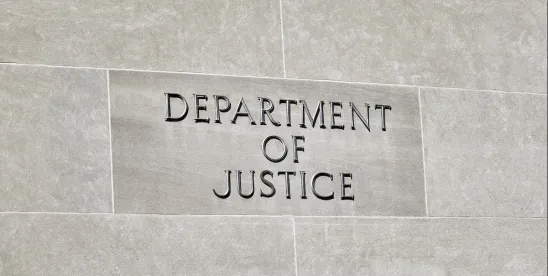The Deputy Attorney General of the U.S. Department of Justice Office recently issued new guidelines for investigations and enforcement actions of the Foreign Corrupt Practices Act. (FCPA). These new guidelines come as a first follow up to President Trump’s Executive Order from February 10, 2025, effectively pausing most FCPA investigations and enforcement. As discussed below, DOJ’s updated guidelines effectively “unpauses” FCPA enforcement with a highlighted emphasis on the current administration’s continuing “America First Priorities.”
More specifically, the June 9 DOJ Memorandum sets forth a “non-exhaustive” list of factors for DOJ to evaluate when considering whether to pursue FCPA investigations and enforcement. DOJ emphasizes two goals, “(1) limiting undue burdens on American companies that operate abroad and (2) targeting enforcement actions against conduct that directly undermines U.S. national interests.” New FCPA investigations and enforcements must be authorized by a senior DOJ official and should only be pursued after consideration of the following factors:
- Total elimination of cartels and transnational criminal organizations – focusing on alleged conduct that is associated with or involves laundering money for a cartel or transnational criminal organization (TCO) or is linked to state-owned entities or foreign officials who have received bribes from cartels or TCOs.
- Safeguarding fair opportunities for U.S. companies – prioritizing the investigation and prosecution of foreign bribery that impacts “specific and identifiable” U.S. entities or individuals (e.g., organizations that engage in bribery that “skew[s] markets and disadvantage[s] law-abiding U.S. companies”).
- Advancing U.S. national security – focusing on “threats to U.S. national security resulting from the bribery of corrupt foreign officials involving key infrastructure or assets.” Key sectors include defense, software, artificial intelligence, critical minerals and deepwater infrastructure.
- Prioritizing investigations of serious misconduct – emphasizing investigations of alleged conduct “that bears strong indicia of corrupt intent tied to particular individuals.”
- Principles of Federal Prosecution – requiring consideration of multiple factors, including the nature and seriousness of the offense and any deterrent effect of prosecution.
- Prosecutorial discretion – noting that DOJ will implement prosecutorial discretion in investigating, prosecuting, and continuing actions based on a totality of the circumstances.
Matthew R. Galeotti, Head of DOJ’s Criminal Division, recently spoke about the new FCPA enforcement guidelines, stating that while “[n]o one factor is necessary or dispositive,” the focus of these guidelines is “vindication of U.S. interests,” and that DOJ will be prioritizing misconduct that “genuinely impacts the United States or American people.”
After a lull in enforcement actions following President Trump’s February Executive Order, the new guidelines demonstrate that FCPA enforcement is alive and well under the current administration. While these new guidelines, along with DOJ and the Trump administration’s concurrent initiatives, emphasize a focus on individuals, non-U.S. entities, and specific business lines (e.g., those that have a risk of interaction with cartels and TCOs), the impact on all organizations will be broad.
The new FCPA enforcement guidelines underscore the importance for organizations to maintain a resilient, risk-based compliance program that implements a consistent and vigilant stance against corruption and bribery that will withstand broad prosecutor discretion and the possibility of policy changes under the current and future administrations. DOJ clarified in its new guidance that it will focus on serious misconduct, rather than “de minimis” violations like small gifts or modest perks (although those may be used in books-and-records charges by the SEC). While gifts, travel expenses and entertainment remain important in an effective compliance program, the new DOJ guidance emphasizes the need for companies to focus their compliance efforts on (1) areas where business decision are made, including third-party representatives and agents, joint ventures, government tenders and public-private partnerships and on (2) business activities in emerging and high-risk corruption regions such as Brazil, Mexico, India and China.
The following are additional key takeaways that organizations should consider in reviewing and enhancing their compliance programs to address the new FCPA enforcement priorities:
DOJ’s Prioritization of Investigating and Prosecuting Individuals
- Impact: The impact to organizations that may come as the result of DOJ’s focus on individual conduct can be broad and significant. From personnel implications to reexamination and even restatement of financial information prepared or certified by specific individuals, organizations can be significantly impacted by individual misconduct and investigation and prosecution of individuals within their businesses.
- Compliance Review: In an effort to prevent such misconduct, businesses should require regular and thorough training on FCPA compliance across their organizations — with a focus on the subjects at the forefront of DOJ’s prohibition of conduct that “directly undermines U.S. national interests.” Any impression that DOJ will not enforce the FCPA or that the FCPA is no longer applicable to specific industries due to DOJ’s updated focus areas should be eliminated throughout the organization, especially among personnel outside the United States.
DOJ’s Focus on “America First” Initiatives
- Impact: International organizations with a U.S. nexus may now be held to higher levels of scrutiny under the FCPA than their U.S. counterparts. DOJ has vowed to “vindicate” U.S. interests through its enforcement of the FCPA, and with this focus, non-U.S. entities may see increased FCPA enforcement for their conduct that is viewed as harm to U.S.-based businesses.
- Compliance Review: Non-U.S. entities should conduct a focused risk assessment and review of policies to determine whether its business could be perceived as negatively implicating U.S. business interests. For instance, DOJ is likely to focus on alleged corruption by international organizations competing with U.S-based companies. Moreover, DOJ is encouraging whistleblower reports, which may be utilized by companies to initiate potential investigations of their competitors. Organizations competing against U.S. companies for business outside the U.S should review and update as needed their compliance procedures and conduct additional training for employees and agents to guard against potential violations. Further, because DOJ has made clear it will use the FCPA to further U.S. interests, it is important that organizations and their leadership understand how national security interest connect with anti-corruption compliance. Organizations should have increased insights into its political contributions, lobbying efforts and dealings with foreign government-owned companies.
DOJ’s Emphasis on Cooperation and Self-Reporting
- Impact: Under the new policy updates, failure by an organization to timely report and cooperate with DOJ’s investigation of individuals can have negative and potentially severe implications on DOJ’s charging decisions. Organizations should also be mindful that they could be tasked with cooperating with DOJ’s review of competitors and foreign contacts accused of FCPA violations. As Bracewell recently reported, DOJ continues to stress the importance of self-reporting by entities that have discovered violations within or outside of their organizations and DOJ has set out powerful incentives for companies to do so.
- Compliance Review: DOJ has emphasized that “significant benefits” will be available to businesses that participate in the fight against corruption. And in contrast, “those who do not come forward despite all the benefits available,” will be “aggressively – yet fairly” prosecuted. Therefore, a robust compliance program that is designed to prevent and detect potential violations of law will not only include policies that forbid specific conduct in addition to broad statements against “violations of law,” but also, in the event that there are perpetrators, will allow for swift identification, investigation and elimination of violations and aid in self-reporting and cooperation efforts. Organizations should encourage a “speak up” culture with easily accessible and anonymous reporting options for employees as well as individuals outside of the organization. Stakeholders should be encouraged to raise concerns and complaints for the organization to review and investigate, and organizations should have effective internal investigation procedures in place to ensure efficient and thorough review of complaints. Moreover, companies should not rely only on manual reviews and internal whistleblowers to detect potential violations. Organizations should consider investing in right-sized automated monitoring that can offer proactive, data-driven detection to allow the organization to identify misconduct early and to act quicker.
DOJ’s Focus on Cartels and TCOs
- Impact: With DOJ putting the world on notice of its focus on cartels and TCOs and tying cartel activity directly to FCPA enforcement, businesses will need to be more cognizant of their third-party intermediaries, agents, vendors, joint venturers and other third parties involved in transactions and avoid activity with these types of organizations, even indirectly.
- Compliance Review: Stringent due diligence, policies and training on identification, verification and risk assessment of third parties will be paramount to ensure effective scrutiny of business partners. Organizations should ensure that “Know Your Customer” (as well as clients and counterparties) standards are updated and properly implemented to ensure proper continued monitoring and verification of third parties. Organizations should also update their risk assessment to identify regions in which cartels and TCOs are known to operate, such as Mexico and Colombia, and consider strengthening compliance procedures and conducting targeting training to reduce the risk in doing business in high-risk areas.
Reaction of Auditors, Banks and Financial Advisors
- Impact: Auditors, banks and financial advisors may have a heightened interest in review of the books, records and internal accounting controls of businesses because of a concern of potential decreased anti-corruption compliance efforts by companies after mixed messaging on DOJ FCPA enforcement. It is likely that auditors and other financial advisors will increase scrutiny of anti-corruption compliance and the internal review or investigation of any potential violations of company policies or applicable laws.
- Compliance Review: It is imperative that all levels of employees are trained and equipped to identify the impact that bribery and corruption can have on an organization’s internal records. Executives must additionally be adequately informed on their organization’s books and records and controls over financial reporting to make accurate representations in connection with the organization’s financial statements. With DOJ’s renewed focus on individual behavior, executives, as well as Audit Committee members, and other board members and senior officials must also be familiar with their obligations to certify accurate financial records. Further, board members and management should take steps to have an adequate understanding of the company’s key compliance programs and how the company has identified and addressed any anti-corruption compliance gaps and/or potential violations of law. Companies should consider refreshing policies and training to ensure each of these key groups understands their roles and responsibilities.
Anti-Corruption Actions Outside of the United States
- Impact: With a drop in FCPA investigations and enforcement actions in the United States following President Trump’s pause on FCPA enforcement, other countries have increased their review of bribery and corruption. As Bracewell discussed in a previous alert, three countries established the International Anti-Corruption Prosecutorial Taskforce focused on anti-corruption initiatives earlier this year, and other countries and law enforcement agencies may follow suit. Similarly, while DOJ has historically been the primary enforcer of the FCPA, the SEC has stated that “FCPA enforcement continues to be a high priority area for the SEC’s enforcement program.” Thus, businesses are still at risk of facing consequences from regulators at home or abroad.
- Compliance Review: In addition to the FCPA, organizations should review their compliance policies and procedures to ensure that they do not conflict with anti-corruption rules and regulations from other areas of the world and continue to be mindful of additional taskforces that may arise as a result as DOJ endeavors to address President Trump’s directives.
In response to these policy updates, and as part of an effective compliance program, organizations should consider steps to strengthen their compliance programs to prevent and detect misconduct, including corruption and bribery. Strong compliance programs that effectively prohibit and identify potential violations are designed around a focus on risk assessments, tone and culture, due diligence, regular training, effective policies and procedures, and continuous monitoring and improvement. Not only will this allow organizations to root-out misconduct, but it will also allow them to capitalize on the self-disclosure benefits emphasized by DOJ if violations are prevented.





 />i
/>i

